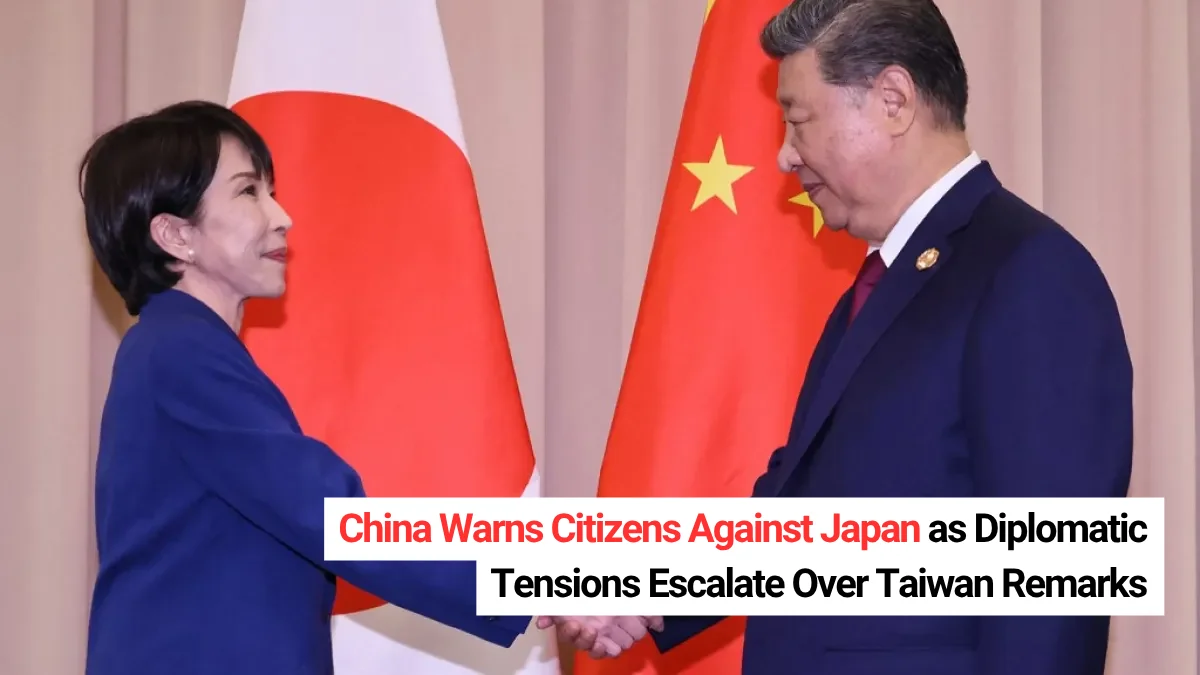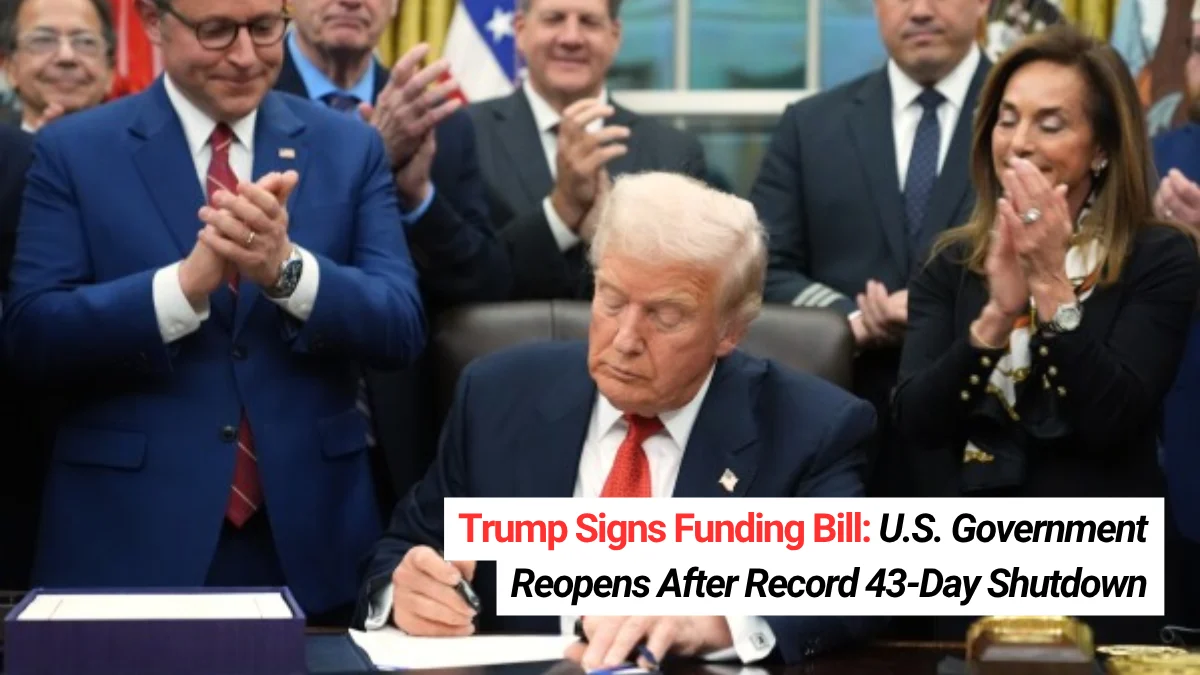China has issued a sharp warning to its citizens, asking them to avoid traveling to Japan after a new political dispute erupted between the two Asian powers.
The fresh advisory comes after Japanese Prime Minister Sanae Takaichi made comments in parliament about the possibility of Japan treating a Chinese attack on Taiwan as a threat to Japan’s own survival. Beijing reacted strongly, calling the remarks provocative.
The tension has now spilled into travel, aviation, diplomacy, and strong statements from both governments.
Key Takeaways
- China has advised its citizens to avoid travel to Japan due to rising tensions.
- The row began after Japanese PM Takaichi linked a potential Taiwan conflict to Japan’s national security.
- Chinese airlines are offering refunds and free ticket changes for travel to Japan.
- Beijing says the comments “damage China–Japan relations” and pose risks to Chinese nationals.
- Japan has summoned Chinese officials and defended its security stance.
Why China Issued the Travel Warning
China released a formal advisory telling its citizens and students to avoid visiting Japan for the time being. The statement said that recent remarks from the Japanese leadership have created “additional risks to the safety and security of Chinese citizens in Japan.” This makes it one of the most serious warnings China has issued in recent years.
The advisory was followed by a quick response from major airlines in China. Air China, China Eastern, and China Southern announced free changes and refunds for certain flights to Japan. This shows Beijing is ready to use economic and people-related channels to send a message.
China’s Ministry of Foreign Affairs said the comments on Taiwan were blatantly provocative and had damaged the atmosphere of exchanges between the two countries. The message was clear: Beijing sees this as a direct political challenge.
The Remarks That Triggered the Diplomatic Clash
The chain of tensions began in the Japanese parliament when Prime Minister Sanae Takaichi was asked about a possible Taiwan scenario. She said that if armed force was used around Taiwan, it could become a “survival-threatening situation” for Japan. Under Japanese law, such a situation could justify military action under the framework of collective self-defense.
These words are significant because Japan normally avoids making explicit statements about military involvement in a Taiwan conflict. Previous leaders kept positions vague. Takaichi’s straightforward remark marked a sharp shift from the usual tone.
China reacted immediately. Beijing summoned Japan’s ambassador and called the comments “extremely wrong and dangerous.” Chinese state media launched strong criticism. Nationalist voices online also targeted the Japanese leader, turning the issue into a major political flashpoint.
China’s Escalation Across Diplomacy and Media
China did not limit its reaction to official statements. The move spread across diplomatic channels, state institutions, and public messaging. The Chinese embassy in Tokyo also warned citizens to avoid travel, repeating that recent political actions in Japan have increased risks.
Soon after, several state-run outlets published tough editorials. One commentary from a PLA-linked platform warned Japan of a “head-on blow” if it ever interfered militarily in the Taiwan Strait. A separate post from China’s Consul General in Osaka added fuel to the fire and was later deleted after criticism from Japanese authorities.
The strong language highlighted how seriously Beijing viewed the remarks. Taiwan remains the central issue in China’s foreign policy, and Beijing treats any external statement on the subject as interference in its internal affairs.
Japan’s Response and Its Stand on Security
Japan responded by summoning China’s ambassador and calling certain online remarks from Chinese officials “highly inappropriate.” Tokyo said it wants stable relations but cannot ignore threats or hostile language directed at its leadership.
Japanese Foreign Minister Toshimitsu Motegi defended the prime minister’s statement. He said it was made within the legal and political framework of Japan’s security policy. Another senior official noted that Japan’s stance on Taiwan remains the same as before: peace and stability in the Taiwan Strait are essential to Japan’s own security.
Japan is also concerned about increasing Chinese coast guard activity around disputed islands in the East China Sea. The day after China issued its advisory, four Chinese coast guard vessels entered waters claimed by Japan. Tokyo saw this as another sign of rising pressure.
The Role of Taiwan in the Security Equation
The Taiwan Strait is central to the strategic relationship between China and Japan. The nearest Japanese islands are close to Taiwan, and any conflict there would have direct consequences for Japanese territory, shipping lanes, and economic stability.
Japan’s laws allow collective self-defense only if another nation’s attack threatens Japan’s survival. This is why statements by Japanese leaders on Taiwan are so sensitive. China considers Taiwan part of its territory and has vowed to take control if necessary. Any mention of Japanese intervention touches China’s “red line.”
Japan has long balanced its economic ties with China and its security alliance with the United States. The new comments from Takaichi suggest a stronger security posture, something Beijing views with suspicion.
A Relationship Strained by History and Strategy
The current clash reflects deeper issues between the two nations. China often brings up Japan’s wartime history during diplomatic exchanges. Japan, on the other hand, worries about China’s growing military presence in the region.
Both countries recently said they want stable relations. They even held a meeting between their leaders to improve ties. But this latest episode shows how quickly tensions can rise over Taiwan-related discussions.
Neither side has withdrawn its statements. As a result, the diplomatic temperature between Asia’s two largest economies remains high. The next steps from both governments will shape how the relationship moves in the coming months.









